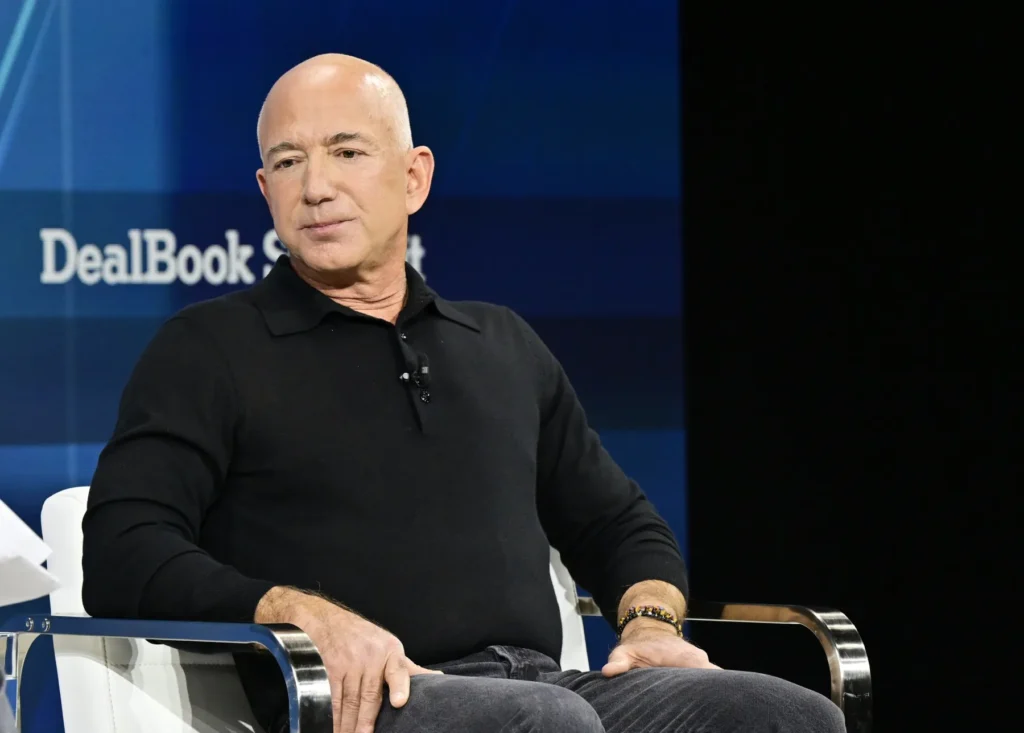🧠 Amazon founder and one of the world’s richest men, Jeff Bezos, called the investment boom in artificial intelligence a “bubble” — one that will inevitably lead to losses but will also accelerate technological progress. According to the billionaire, such periods — painful yet productive — are what push civilization forward.
Speaking at the Italian Tech Week in Turin, Bezos said that the current AI craze resembles classic phases of technological overheating — when capital and enthusiasm outpace common sense.

Jeff Bezos Photographer: Eugene Gologursky/Getty Images
“When people are as excited as they are about AI today, every project gets funded — both the good and the bad ones,” Bezos said (as quoted by Bloomberg). He gave examples of companies that had received multi-billion-dollar investments without even presenting a prototype.
A bubble as a driver of progress
Bezos admitted that such hype can be dangerous for investors. During times when billions flood the market, the line between real innovation and speculation becomes almost invisible. “In the midst of all this enthusiasm, it’s hard for investors to tell good ideas from bad ones,” he said.
Yet, in his view, real breakthroughs are often born inside these bubbles. He recalled the biotech boom of the 1990s: “Many companies went bankrupt, investors lost money — but we still got a few life-saving drugs.”

Giulio Lapone/Keystone Press Agency/Global Look Press
Therefore, Bezos believes industrial bubbles shouldn’t be seen merely as economic failures. They act as catalysts — clearing the market of weak ideas while leaving behind technologies that reshape reality. “When the dust settles, it becomes clear who the winners are, and society benefits from those inventions,” he added.
AI as a new industrial cycle
Bezos emphasized that artificial intelligence isn’t just another tech trend but a foundational platform that will transform every industry — from medicine and finance to energy and education. “AI will change every company in the world and boost productivity everywhere,” he said.
Essentially, Bezos views today’s AI boom as the beginning of a new industrial cycle — one comparable in scale to the Industrial Revolution or the birth of the internet. The coming years will bring failures, bankruptcies, and thousands of collapsed startups — but the survivors will define the architecture of the future economy.

History repeats itself
Analysts have repeatedly compared the current AI race to past bubbles — the dot-coms of the 2000s, the railways of the 19th century, the oil boom of the 20th, and even the crypto bubble of recent years. All followed a familiar pattern: euphoria, overvaluation, collapse, and eventually, growth built on survivors.
Amazon itself was born during such a period — the internet bubble. Many disappeared, but Amazon endured and became a pillar of the digital economy. Few people understand better than Bezos how to turn a “bubble” into a platform for the future.
Order from chaos
According to Bezos, today’s AI frenzy follows the same logic. Yes, capital doesn’t always flow where it should. Yes, some investments will burn. But the process is unstoppable — and will ultimately benefit humanity.
“The same will happen now. The advantages of artificial intelligence for society will be enormous,” Bezos stressed.
He added that such cycles are a natural part of technological evolution: first comes the storm of ideas and money, then the filtering phase, and finally — a new reality where the survivors become giants.
🔍 Conclusion
Bezos urges people not to fear “bubbles” but to understand their role. Each surge is not a market mistake, but a necessary stage of innovation. Artificial intelligence, like electricity or the internet before it, cannot be stopped.
And if the world is spending trillions on AI today, Bezos insists it’s not madness — it’s an investment in the future, one that will come with losses but also with breakthroughs that will change everything.
All content provided on this website (https://wildinwest.com/) -including attachments, links, or referenced materials — is for informative and entertainment purposes only and should not be considered as financial advice. Third-party materials remain the property of their respective owners.


